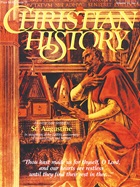The lines were written by T. S. Eliot in his apocalyptic poem, The Waste Land. Partly famous because they were written by Eliot, they are also famous because of who and what they allude to: the sexual fires that burned in the youthful Augustine. From adolescence to the age of 32, as he later detailed in the Confessions, Augustine was a frequent loser in the battle with lustful passions.
However, his struggles with sexuality actually began before his arrival at the decadent North African metropolis of Carthage. He later wrote that it was at the age of 16 that “the frenzy gripped me and I surrendered myself entirely to lust.”
Both his parents were aware that he was “floundering in the broiling sea of … fornication,” but each responded differently. His father, who seems to have also been entangled in extramarital affairs, was amused at his son’s budding sexual interests. The prospect of grand children—legitimate or otherwise—appealed to Patricius. Monica, on the other hand, was caught in a dilemma. She did not suggest marriage for quelling the sexual fires, because she feared that a hurried marriage would hinder her gifted son’s career opportunities. At the same time, she earnestly warned him about his lack of sexual restraint, saying, “above all [do] not seduce any man’s wife.”
As an 18-year-old student at Carthage, Augustine reveled in promiscuity. Sex had become an obsession for him. “From a perverted act of will,” he wrote, “desire had grown, and when desire is given satisfaction, habit is forged; and when habit passes unresisted, a compulsive urge sets in.”
After a year of promiscuity in that university city, Augustine settled down with a mistress. Although he never revealed her name, he remained with her for more than a decade. She bore him a son named Adeodatus.
The young scholar had become a professor of rhetoric in Milan when Monica, his ever-persistent mother, persuaded him to send his unnamed mistress away so that he might acquire the hand of a high-society Milanese girl. Part of the arrangement was that Augustine had to remain chaste for two years, that is, until the girl reached marriageable age. But his sexual passions prevented him from keeping his part of the bargain. Not long after sending away the mother of Adeodatus, he took another mistress. “I thought it should be too miserable,” he lamented, “unless folded in female arms.”
As he came to accept the truth of Christ, one great obstacle that deterred him from fully embracing Christianity was his sexual proclivity. Epitomizing this inner turmoil was his confused prayer, “Give me chastity… but not yet.”
To Augustine’s mind, converting to Christianity meant abandoning marriage altogether. As he records his conversion in the Confessions, he describes being torn between marriage and chaste devotion to God. He decided it could be only the latter for him.
After his conversion, he had much to say about sex and marriage. The fall of Adam, he taught, drastically affected human sexuality. In particular, human nature had fallen under the compulsive power of concupiscence, or lust, which he understood as the passionate, uncontrolled element in sexuality. Augustine believed that all sexual intercourse—even within the bounds of Christian marriage—involved concupiscence.
But Augustine did not altogether disparage matrimony. It is “honorable and permissible,” he said. But to him, celibacy was better. The purpose of sex in marriage is procreation, he said, although it was “pardonable” if married persons enjoyed conjugal union without intending procreation. He even went so far as to recommend sexual abstinence for married couples—if they mutually agreed to it.
Over the years, the bishop of Hippo’s views on sex and marriage became the bases for many of the Roman Church’s teachings on these matters. If we look closely at the writings of Augustine, we can better understand why Roman Catholics believe that the chief end of marriage is procreation, that divorce and birth control are impermissible, and that continence is the ideal for sexual self-discipline.
Copyright © 1987 by the author or Christianity Today/Christian History magazine.
Click here for reprint information on Christian History.

Support Our Work
Subscribe to CT for less than $4.25/month





























